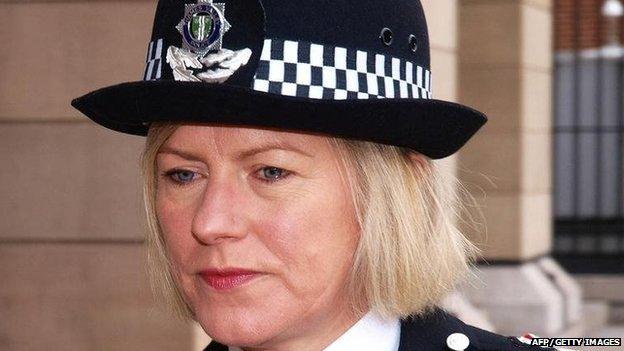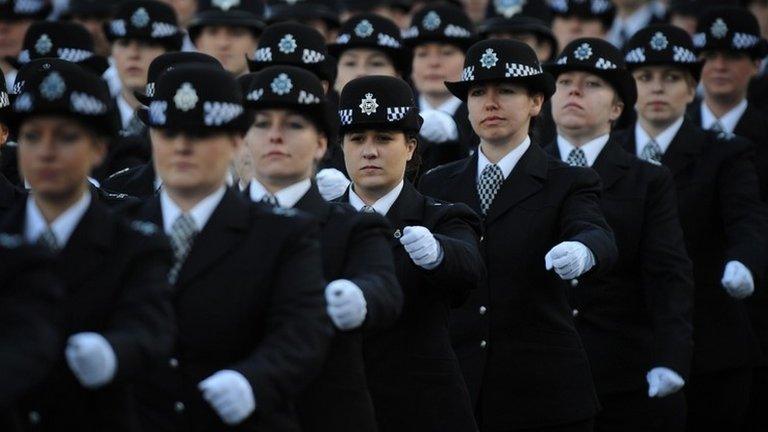Police forces must reform to survive cuts, says new chief
- Published

Police services in England and Wales need radical reform if they are to survive tough budget cuts, a leading officer has warned.
The police system must be "re-imagined", argued Sara Thornton, in her first major speech as head of the new National Police Chiefs' Council (NPCC)., external
Ms Thornton called the expected loss of 35,000 more police posts by 2020 a "game changer".
But she said traditional "bobbies-on-the-beat" would still be needed.
Ms Thornton, who took up her role in April when the NPCC replaced the Association of Chief Police Officers (Acpo), called on forces to re-shape the workforce and integrate emergency services.
She said the police service needed fundamental reform because of central government spending cuts, which may mean a reduction of 35,000 police officers and civilian staff on top of a cut of 36,000 posts since 2010.
"The loss of over 70,000 posts in ten years is a game changer," she said.
"Cutting staff numbers at this level and not changing the way we work will cause service failure and unacceptably stress our staff."
But referring to an accusation by the home secretary that the Police Federation too often "cried wolf" about the impact of policy on policing, she added: "I do not have a history of crying wolf and I am not doing so now."

Sara Thornton is the head of the new National Police Chiefs' Council
Ms Thornton said that if police adopted a "slash and burn" approach to cuts, forces would not be able to offer the same protection to the public.
Instead forces should focus on effective policing and integrate with other services at all levels, she argued.
"We need to create more capacity by taking steps out of process, people out of systems and making our people more productive.
"We need to re-imagine the whole system, not incrementally reform."
Foot patrol
The former Thames Valley chief constable also rejected suggestions made last week by Essex Police and Crime Commissioner Nick Alston that bobbies-on-the-beat were out-of-date.
Mr Alston had argued police should focus on areas where they could "make a difference to crime reduction".
"I'd love other forces to learn that you don't want bobbies-on-the-beat. You want highly-trained detectives who can obtain best evidence interviews really well, who have got the skills to manage a relationship with social care so we can do the safeguarding for the children who are coming to harm," Mr Alston told The Times.
But Ms Thornton said foot patrol was shown to be effective when targeted in small areas, or where there were crime "hot-spots", rather than when it was "random and lacking in focus".
"The evidence does not show that 'bobbies on the beat' is an outdated idea, but that it can be effective as part of data-driven targeting of preventive patrol."
She also dismissed the prospect of merging some of the 43 forces in England and Wales, saying local taxation differences, local politics and the introduction of police and crime commissioners, would make this very difficult.
But she said police needed to develop new methods to deal with digital crime and globalisation, and radically alter police pay structures so officers' salaries reflected their skills rather than their "rank and time served".
"We surely have to move away from a model where a constable with six years service is paid the same, whether they have numerous accredited skills and significant expertise or not," she said.
- Published7 March 2015

- Published1 December 2014
